Saturday, March 10, 2007
Dispensing lots of good old fashioned TLC
This blog has previously shown that huge efforts on the part of the Chavez government to improve the level of medical care available to Venezuelans, and particularly poor Venezuelans. What started out with the by now world famous Barrio Adendtro program has long since expanded to more sophisticated ambulatory care sites, then to fully integral diagnostic centers with the most advanced equipment available anywhere and is now moving into completely renovated and/or new hospitals.
These great programs have been done all along with a tremendous sense of social solidarity, not just across class lines in Venezuela but even to the poor throughout Latin America. Thousands have been flown, at Venezuelan expense, to Cuba for sophisticated surgeries including the correction of cataracts. And the brand new pediatric cardiology Hospital in Caracas (which we should never forget the opposition heaped lots of scorn on) has already helped hundreds of seriously ill children from all over Latin America.
Another component of this is that the Chavez government has set up hundreds of rehabilitation centers all over Venezuela. This is really a very vital and almost always overlooked area of medical care. Of course, the wealthy have always realized its importance and availed themselves of it. Rehad centers in the U.S. have become all the rage amongst the wealthy elite from Betty Ford to Britney Spears (substance abuse rehab centers for lower income Americans are generally jails). Physical rehab centers are equally important after a person has sustained a serious injury has physical impairments for any other reasons.
Under previous Venezuelan governments poor people who had disabilities or injuries were completely left to their own devices. In fact, such was the level of indifference that the Caracas Metro system didn’t even have elevators to allow it to be accessed by people in wheelchairs. It is the Chavez government which is now spending many millions to retrofit the metro stations with elevators.
And it is spending many millions building worthy rehabilitation centers which are accessible to all. Lets take a look at one in Playon:
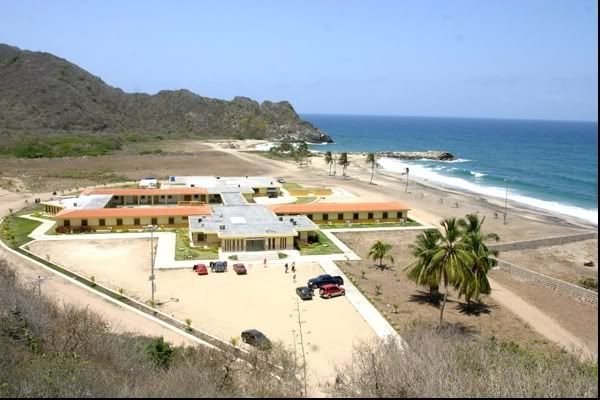
Wow, what a setting. Ok, most Venezuelan rehab centers aren’t in locations this idyllic – but it is what’s inside that counts anyways.
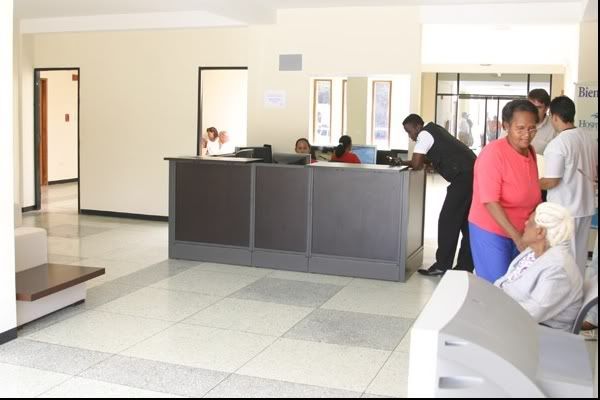
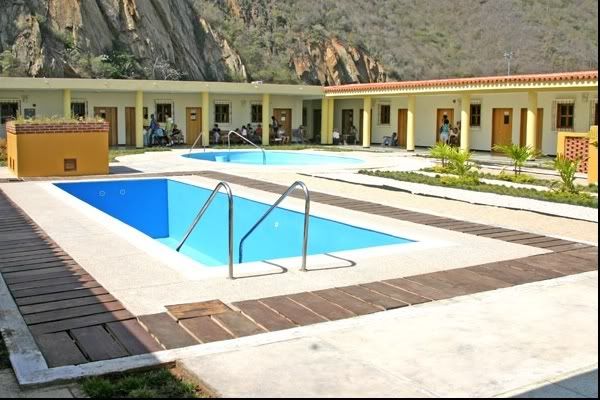
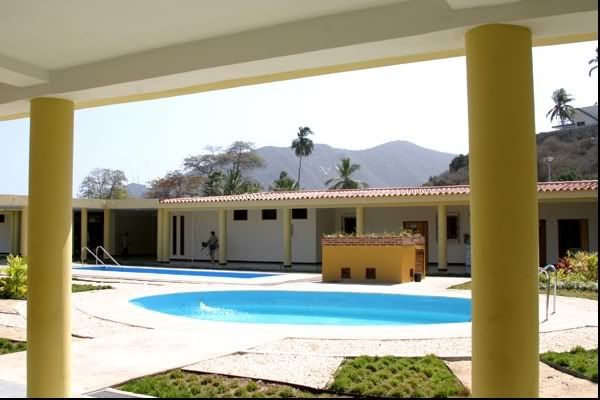
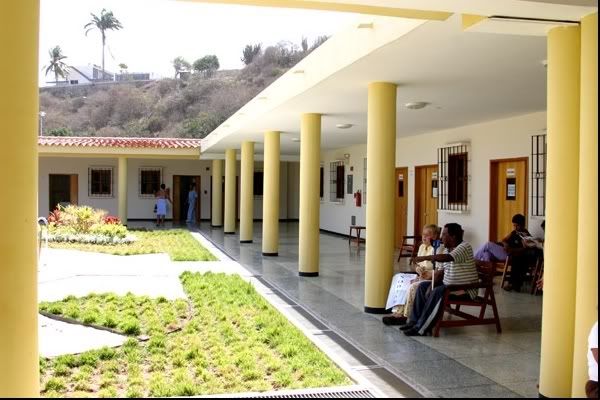
Notice how neat and clean this thing is. That is very important from a health perspective (not spreading disease) and also from a psychological perspective of making people feel better by having them in a very pleasant environment. In this respect I have to say I really like the garden courtyard – it is a very nice touch.
Also, this is very indicative of something I’ve pointed out before regarding the Chavez government – it doesn’t build junk just to meet targets. It insists on building quality – even more so when what is being built is meant for the poor. The world over the poor our showered with third rate junk, built on the cheap by stingy governments, which quickly falls apart (and of course, the poor always get blamed for it having fallen apart – “they don’t take proper care of things” the right wing jerks squeal as if shody construction had nothing to do with it). Not the Chavez government though. Last year when we took an up-close look at the low income housing it was building we were amazed by the high quality. Now we see the same with these rehab centers.
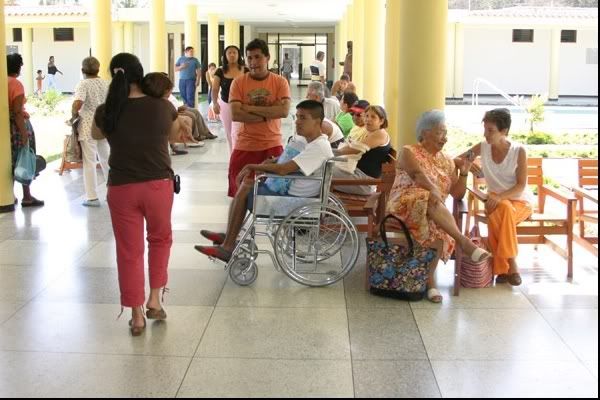
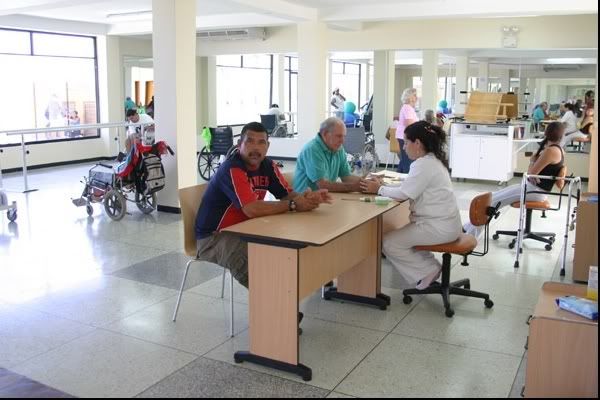
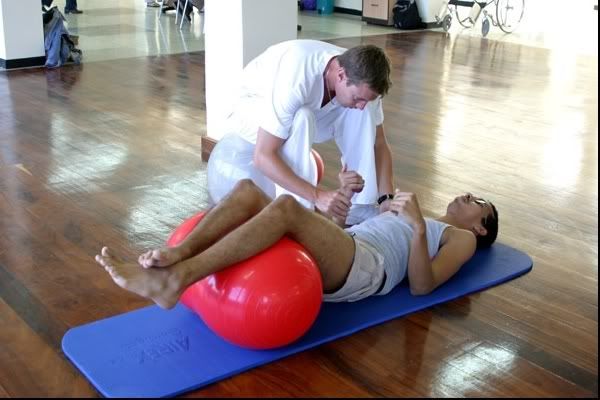
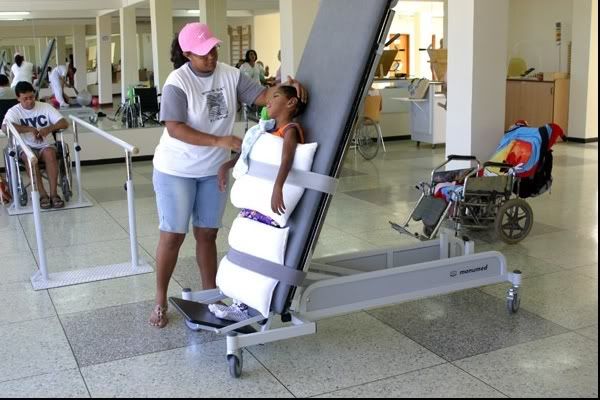
Looking at these pictures I see the same sort of physical rehab equipment I’ve used when I’ve needed to go through this ( a dislocated shoulder here, a broken hand there). Some of it is quite simple, some of it is sophisticated and expensive.
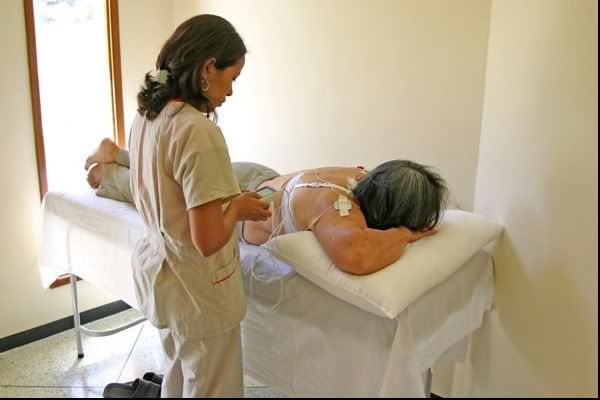
Ah, this is one of my favorites – the electrical stimulation of muscles. It is supposed to speed up the healing of strained or damaged muscles and it feels REALLY nice. I had it done to me and I wished I could buy one for my home. I’m envious just looking at this woman.
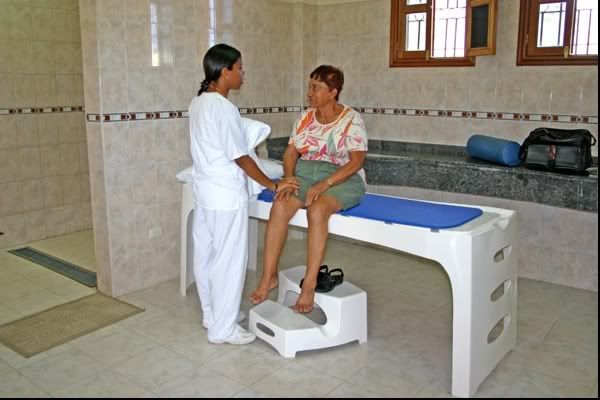
Damn this looks nice with all those fancy tiles.
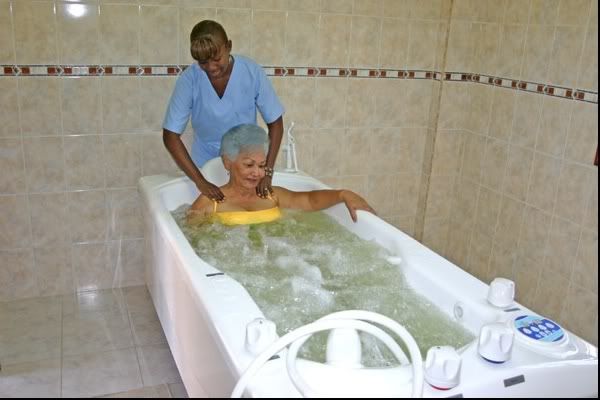
Alright, now I’m starting to wonder, is this a rehab center or is it a spa? A back massage while sitting in a hot tub with therapeutic water jets!! Damn, after a hard day blogging how I could use that!
I don’t know if everyone recalls it but during the presidential campaign Chavez ran a series of advertisements talking about his love for Venezuela and its people. He recounted how everything he had ever done in his life, from playing baseball to being a military cadet, he had done out of love for that activity and how all his endless hours of work trying to govern Venezuela he does out of love for his fellow countrymen.
The opposition of course derided that message and even some Chavistas may have regarded it as hokey. Not me. I always understood the message and never had any doubt that it is true. Chavez truly does love and care deeply about Venezuelans – particularly those who have been most neglected. That is why I decided to post these pictures. While they do indeed show a very nice rehabilitation center what to me they show more than anything else is Chavez’s love for his countrymen. These pictures are pictures of love in action.
|
These great programs have been done all along with a tremendous sense of social solidarity, not just across class lines in Venezuela but even to the poor throughout Latin America. Thousands have been flown, at Venezuelan expense, to Cuba for sophisticated surgeries including the correction of cataracts. And the brand new pediatric cardiology Hospital in Caracas (which we should never forget the opposition heaped lots of scorn on) has already helped hundreds of seriously ill children from all over Latin America.
Another component of this is that the Chavez government has set up hundreds of rehabilitation centers all over Venezuela. This is really a very vital and almost always overlooked area of medical care. Of course, the wealthy have always realized its importance and availed themselves of it. Rehad centers in the U.S. have become all the rage amongst the wealthy elite from Betty Ford to Britney Spears (substance abuse rehab centers for lower income Americans are generally jails). Physical rehab centers are equally important after a person has sustained a serious injury has physical impairments for any other reasons.
Under previous Venezuelan governments poor people who had disabilities or injuries were completely left to their own devices. In fact, such was the level of indifference that the Caracas Metro system didn’t even have elevators to allow it to be accessed by people in wheelchairs. It is the Chavez government which is now spending many millions to retrofit the metro stations with elevators.
And it is spending many millions building worthy rehabilitation centers which are accessible to all. Lets take a look at one in Playon:

Wow, what a setting. Ok, most Venezuelan rehab centers aren’t in locations this idyllic – but it is what’s inside that counts anyways.




Notice how neat and clean this thing is. That is very important from a health perspective (not spreading disease) and also from a psychological perspective of making people feel better by having them in a very pleasant environment. In this respect I have to say I really like the garden courtyard – it is a very nice touch.
Also, this is very indicative of something I’ve pointed out before regarding the Chavez government – it doesn’t build junk just to meet targets. It insists on building quality – even more so when what is being built is meant for the poor. The world over the poor our showered with third rate junk, built on the cheap by stingy governments, which quickly falls apart (and of course, the poor always get blamed for it having fallen apart – “they don’t take proper care of things” the right wing jerks squeal as if shody construction had nothing to do with it). Not the Chavez government though. Last year when we took an up-close look at the low income housing it was building we were amazed by the high quality. Now we see the same with these rehab centers.




Looking at these pictures I see the same sort of physical rehab equipment I’ve used when I’ve needed to go through this ( a dislocated shoulder here, a broken hand there). Some of it is quite simple, some of it is sophisticated and expensive.

Ah, this is one of my favorites – the electrical stimulation of muscles. It is supposed to speed up the healing of strained or damaged muscles and it feels REALLY nice. I had it done to me and I wished I could buy one for my home. I’m envious just looking at this woman.

Damn this looks nice with all those fancy tiles.

Alright, now I’m starting to wonder, is this a rehab center or is it a spa? A back massage while sitting in a hot tub with therapeutic water jets!! Damn, after a hard day blogging how I could use that!
I don’t know if everyone recalls it but during the presidential campaign Chavez ran a series of advertisements talking about his love for Venezuela and its people. He recounted how everything he had ever done in his life, from playing baseball to being a military cadet, he had done out of love for that activity and how all his endless hours of work trying to govern Venezuela he does out of love for his fellow countrymen.
The opposition of course derided that message and even some Chavistas may have regarded it as hokey. Not me. I always understood the message and never had any doubt that it is true. Chavez truly does love and care deeply about Venezuelans – particularly those who have been most neglected. That is why I decided to post these pictures. While they do indeed show a very nice rehabilitation center what to me they show more than anything else is Chavez’s love for his countrymen. These pictures are pictures of love in action.
|
Thursday, March 08, 2007
Boom pains
If you listen to the opposition you know that the Venezuelan economy is going to hell. And they are right. There have been sporadic shortages of food in supermarkets. You have to wait from six months to a year to buy a car. And apparently there are chronic power outages in some parts of Venezuela. What person would possibly want to live in such a country?
Actually, most Venezuelans would. The reason being that these problems aren’t the result of true shortages or declines in goods available. Rather they result from Venezuelans having their standard of living go way up (doubling for most people!) and their level of consumption going way up with it.
So the reason there are “shortages” is that consumption is booming so fast supply is having a hard time keeping up with demand. That is what happens when you have record automobile sales the last two years running and then have the sales rocketing up another 50% the first two months of this year. It is also what happens when food consumption goes up 9% last year and is apparently going up another 10% this year.
And lest you think this is only happening with cars and food it is actually breaking out all over. For example, in today’s Ultimas Noticias it was reported how the electric distribution system in western Venezuela is not doing well. Apparently blackouts and other service disruptions are becoming more frequent. So do we have have another example of the Chavez government running the economy into the ground?
Sort of, in the same way as with automobiles and food. See, from the article it turns out that the culprit behind the blackouts is booming electricity consumption. Up until 2003 electric consumption in Venezuela has been growing at a “normal” rate of 4% which the electric grid can keep up with and ensure a reliable supply. Unfortunately for the poor electric companies Chavez has the economy on such a tear that electric consumption has been growing in Venezuela at the rate of 10% per year for the past 4 years. Yes, you read correctly – electric consumption has been growing 10% per year. I guess that must be the result of all the new refridgerators, washing machines, dryers, microwave ovens, TVs and other appliances that Venezuelans are buying.
So you see, what there are in Venezuela aren’t real problems or real shortages – what there are is growing pains resulting from extremely rapid growth. “Boom pains” if you will.
By the way, there is another important twist to all this that bears paying attention to. It has been a common theme parroted by opposition apologists that whatever good is happening with the Venezuelan has nothing to do with Chavez – it is all the result of oil prices having gone up. Funny thing though, oil prices have gone down significantly since last summer. Yet the Venezuelan economy booms on.
What is that about? I guess maybe it isn’t all about oil. Maybe its Chaveznomics!
|
Actually, most Venezuelans would. The reason being that these problems aren’t the result of true shortages or declines in goods available. Rather they result from Venezuelans having their standard of living go way up (doubling for most people!) and their level of consumption going way up with it.
So the reason there are “shortages” is that consumption is booming so fast supply is having a hard time keeping up with demand. That is what happens when you have record automobile sales the last two years running and then have the sales rocketing up another 50% the first two months of this year. It is also what happens when food consumption goes up 9% last year and is apparently going up another 10% this year.
And lest you think this is only happening with cars and food it is actually breaking out all over. For example, in today’s Ultimas Noticias it was reported how the electric distribution system in western Venezuela is not doing well. Apparently blackouts and other service disruptions are becoming more frequent. So do we have have another example of the Chavez government running the economy into the ground?
Sort of, in the same way as with automobiles and food. See, from the article it turns out that the culprit behind the blackouts is booming electricity consumption. Up until 2003 electric consumption in Venezuela has been growing at a “normal” rate of 4% which the electric grid can keep up with and ensure a reliable supply. Unfortunately for the poor electric companies Chavez has the economy on such a tear that electric consumption has been growing in Venezuela at the rate of 10% per year for the past 4 years. Yes, you read correctly – electric consumption has been growing 10% per year. I guess that must be the result of all the new refridgerators, washing machines, dryers, microwave ovens, TVs and other appliances that Venezuelans are buying.
So you see, what there are in Venezuela aren’t real problems or real shortages – what there are is growing pains resulting from extremely rapid growth. “Boom pains” if you will.
By the way, there is another important twist to all this that bears paying attention to. It has been a common theme parroted by opposition apologists that whatever good is happening with the Venezuelan has nothing to do with Chavez – it is all the result of oil prices having gone up. Funny thing though, oil prices have gone down significantly since last summer. Yet the Venezuelan economy booms on.
What is that about? I guess maybe it isn’t all about oil. Maybe its Chaveznomics!
|
Tuesday, March 06, 2007
Just for the record
I know this is looking in the rear view mirror on an issue that is over and done with but the European Union finally put its report on the 2006 Venezuelan presidential election on the web here.
It is certainly worth a look:
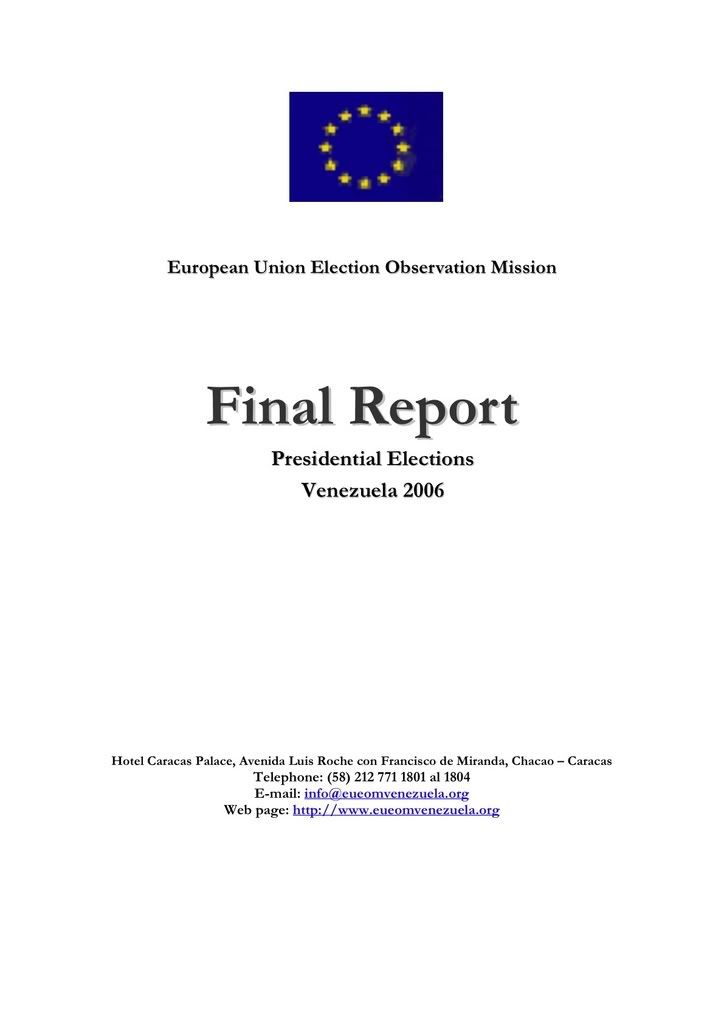
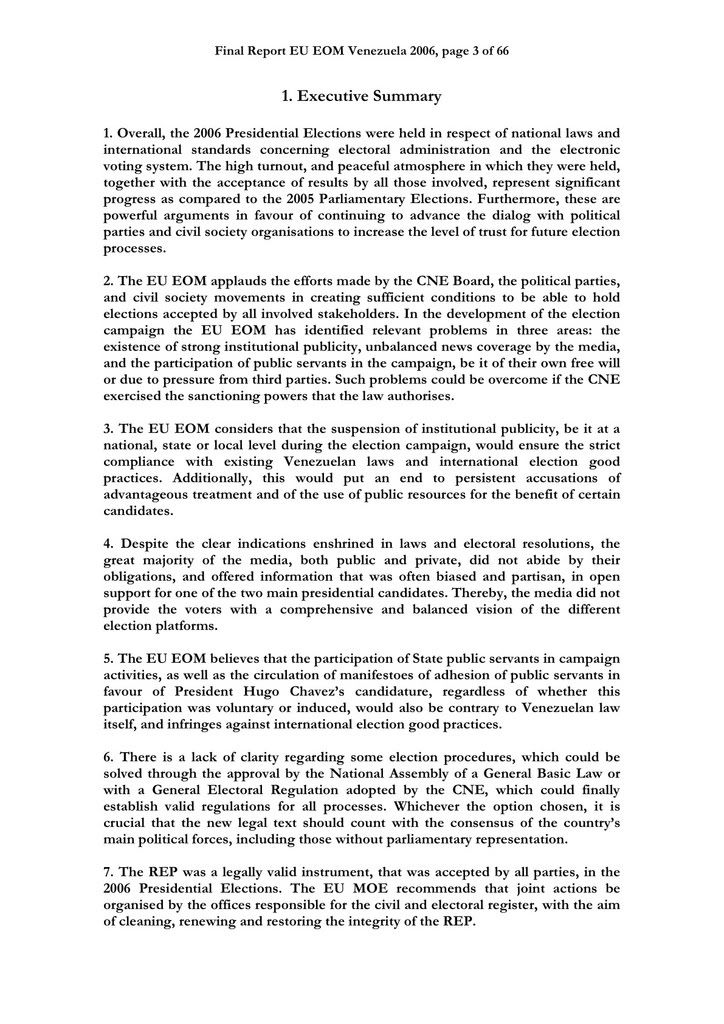
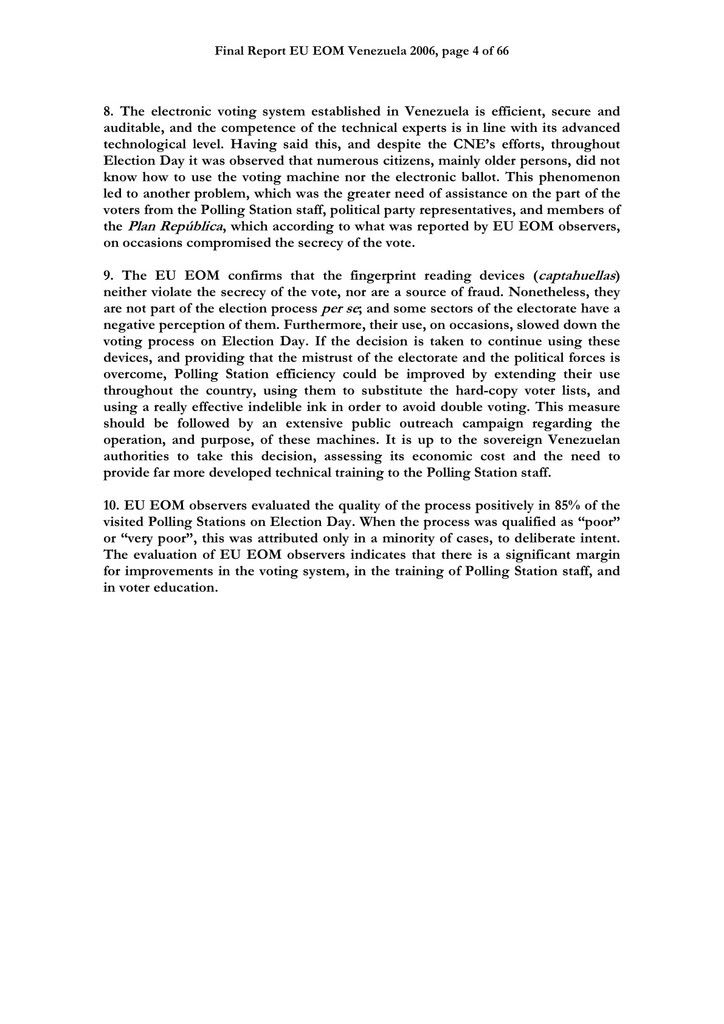
As the European Union notes, the elections were held in compliance with Venezuelan laws and met the international standards. That is, Hugo Chavez Frias is the DULY and LEGITIMATELY elected president of Venezuela despite all the non-sense of opposition loonies.
In going into the details of the reports there are several things that are noteworthy.
1) The EU found Venezuelan's electronic voting system to be excellent and, most importantly, completely auditable. In fact, the actual hardware was completely audited by ALL involved parties and found to be excellent. Of course, the paper ballots were also audited (by an "oversized sample" no less!) after the election. With all this, it is certain there was no fraud in the vote tabulation.
2) The Venezuelan electoral authorities, the CNE, were very cooperative to all parties involved, dispelling the notion that they somehow just serve Chavez's interests.
3) The electoral registry, while containing errors, was a perfectly valid, legal, and audited database the provided a legitimate basis for the election.
4) The fingerprint machines were also audited and were found to not at all promote fraud or compromise the secrecy of the vote (all the opposition lies notwithstanding!)
5) The government of President Chavez did unfairly use state resources to further its campaign and government workers were actively involved in his campaign which goes against both the law and international norms. The U.E. stressed the need for the CNE to fix this going foward.
6) It found that the media, both public and private, were invariably highly biased towards one side or the other. Uh, duhhh. It's kind of hard to watch Venezuelan TV for more than five minutes and not figure that one out.
Regardless they did do a very interesting analysis of the coverage overed by all the different media some of which I am posting here:
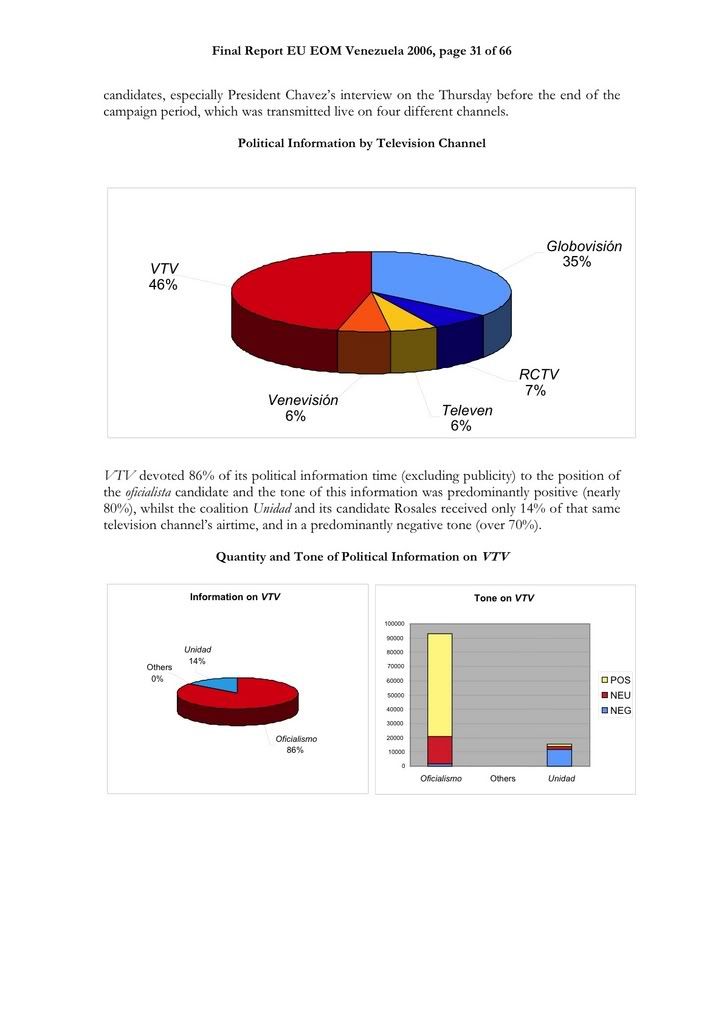
This first slide shows how the government TV channel, VTV, was highly biased in favor of the government, giving Chavez lots of favorable coverage and Rosales lots of negative coverage.
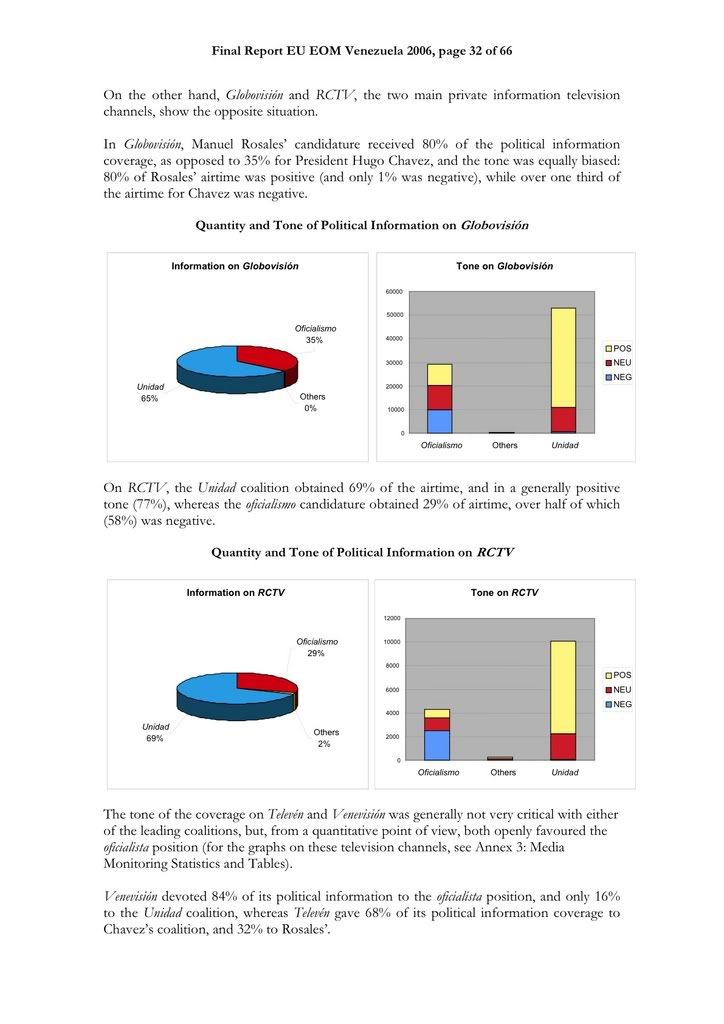
This slide shows how Globovision and RCTV gave Rosales lots of positive coverage (and note both of them gave Rosales virtually NO negative coverage!) and Chavez lots of negative coverage.
The E.U. used this to point out how dysfunctional Venezuelan media is which is certainly true. Thing is, it does sort of balances. As long as you watch two hours of VTV and two hours of Globovision each night you'll get four hours of "fair and balanced" coverage!
Again, this is all just for the record but if you do have the time read the report. It contains lots of worthwhile information. And it helps rebut all the non-sense that the crazies are already starting to come out with.
|
It is certainly worth a look:



As the European Union notes, the elections were held in compliance with Venezuelan laws and met the international standards. That is, Hugo Chavez Frias is the DULY and LEGITIMATELY elected president of Venezuela despite all the non-sense of opposition loonies.
In going into the details of the reports there are several things that are noteworthy.
1) The EU found Venezuelan's electronic voting system to be excellent and, most importantly, completely auditable. In fact, the actual hardware was completely audited by ALL involved parties and found to be excellent. Of course, the paper ballots were also audited (by an "oversized sample" no less!) after the election. With all this, it is certain there was no fraud in the vote tabulation.
2) The Venezuelan electoral authorities, the CNE, were very cooperative to all parties involved, dispelling the notion that they somehow just serve Chavez's interests.
3) The electoral registry, while containing errors, was a perfectly valid, legal, and audited database the provided a legitimate basis for the election.
4) The fingerprint machines were also audited and were found to not at all promote fraud or compromise the secrecy of the vote (all the opposition lies notwithstanding!)
5) The government of President Chavez did unfairly use state resources to further its campaign and government workers were actively involved in his campaign which goes against both the law and international norms. The U.E. stressed the need for the CNE to fix this going foward.
6) It found that the media, both public and private, were invariably highly biased towards one side or the other. Uh, duhhh. It's kind of hard to watch Venezuelan TV for more than five minutes and not figure that one out.
Regardless they did do a very interesting analysis of the coverage overed by all the different media some of which I am posting here:

This first slide shows how the government TV channel, VTV, was highly biased in favor of the government, giving Chavez lots of favorable coverage and Rosales lots of negative coverage.

This slide shows how Globovision and RCTV gave Rosales lots of positive coverage (and note both of them gave Rosales virtually NO negative coverage!) and Chavez lots of negative coverage.
The E.U. used this to point out how dysfunctional Venezuelan media is which is certainly true. Thing is, it does sort of balances. As long as you watch two hours of VTV and two hours of Globovision each night you'll get four hours of "fair and balanced" coverage!
Again, this is all just for the record but if you do have the time read the report. It contains lots of worthwhile information. And it helps rebut all the non-sense that the crazies are already starting to come out with.
|
Sunday, March 04, 2007
If you can't beat 'em, ape 'em
One of the opposition's main weaknesses has always been that is that it is, well, an opposition. Not only do I always refer to them as "the opposition" but they refer to themselves that way most of the time too.
There is a reason for that. In most countries political parties or groups define themselves by what they believe in - the communists believe in communism, the Greens believe in envirnmentally sound policies, Libertarians believe in minimal government and U.S. Republicans believe in capitalism and a strong military among other things.
The Venezuelan opposition believes in... not much of anything, other than opposing Chavez and advocating that THEY be given power instead. They certainly doen't have any principled differences with Chavez and, to my knowledge, have never offered and coherent alternative program.
Want to see exhibit A of this? Take a look at a couple of advertisements from today's Ultimas Noticias. The first was taken out by the Chavez government:
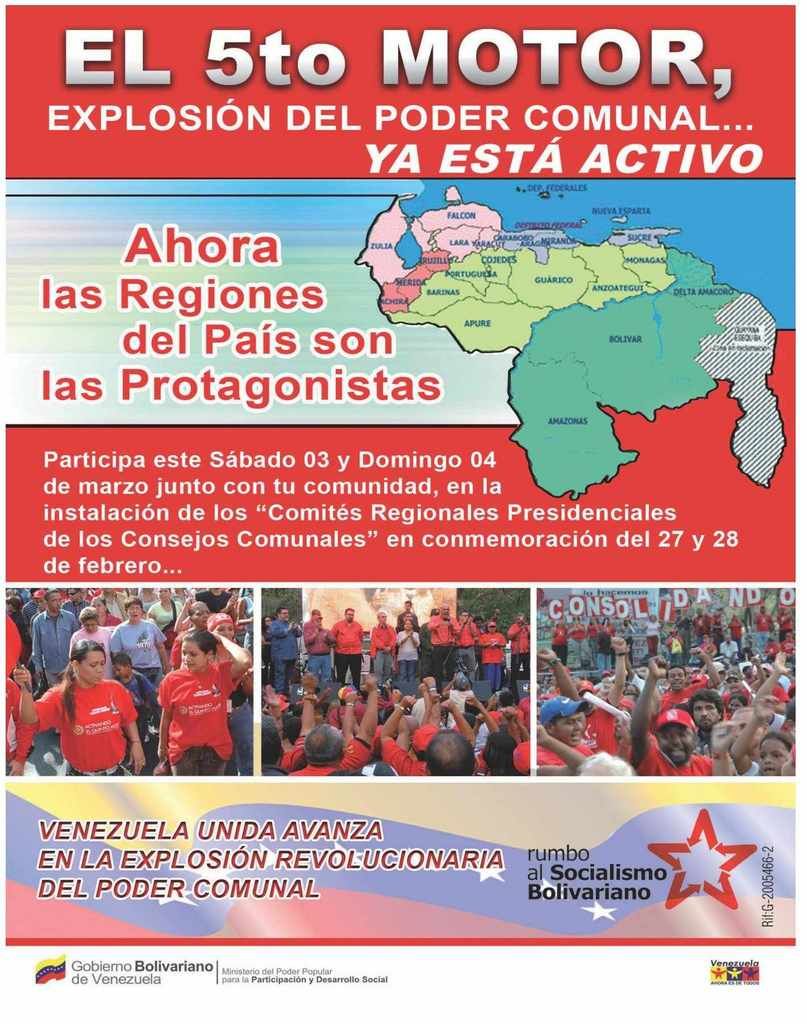
This advertisement heralds the formation of local community councils and the devolution of more power to those councils and to regional (not State) entities. This is the type of thing that has some conspiratorial fanatics claiming that Venezuela is turning communist (communal councils equal Soviets we are told) and this "regional" power structure is just a way to strip State governments of power. And of course, the advertisement is all in red, so communist it must be.
Yet in Ultimas Noticias we also ran accross this rather interesting advertisement:
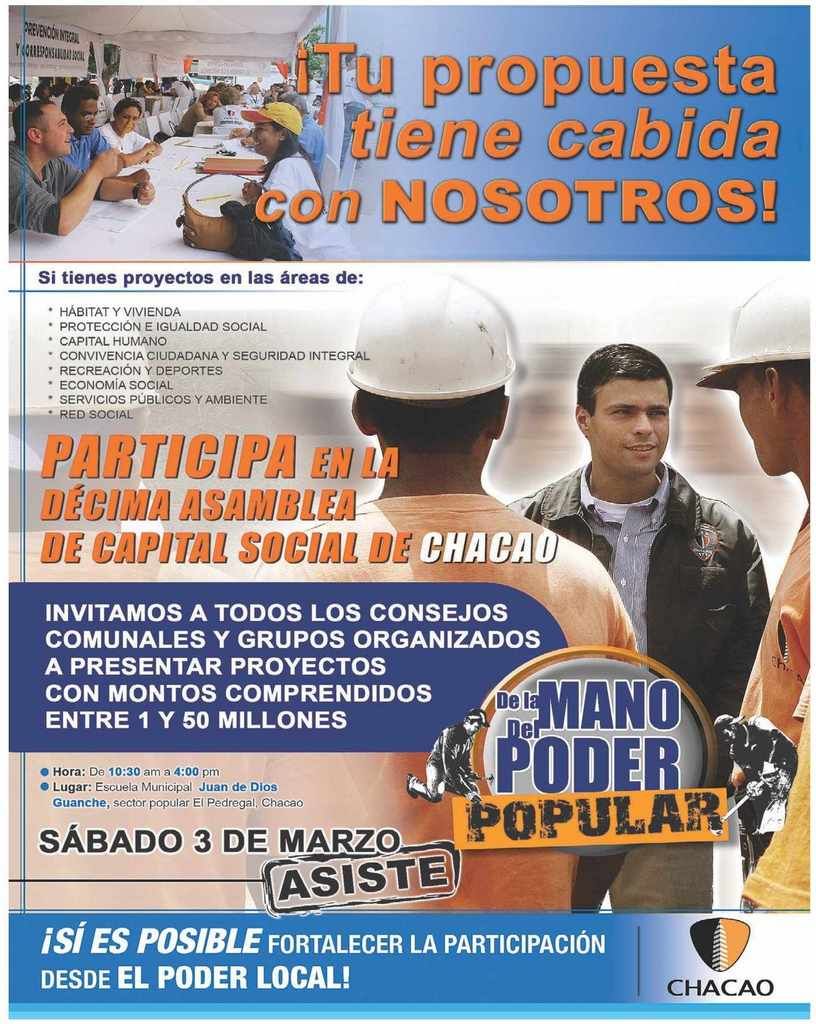
Yes, those of you who read Spanish are reading correctly - this is an advertisement by the staunchly anti-Chavez city government of Chacao (an upper class area of Caracas) pushing popular power. In fact, they are claiming that they want to give out large sums of money to "community councils" for various initiatives these councils might implement. When Chavez does this it is called communism or vote buying. Yet when the opposition does the same thing it is ... simply their pathetic attempt to ape Chavez.
This leads us back to where this post began. When Chavez starts up huge social programs called Missions the opposition after fighting them tooth and nail says at campaign time they will expand them. When Chavez helps raise the poors standard of living the opposition claims it will out do him by simply showering money on the poor that they will not have to earn and will be free to use as they please. And now when Chavez is pushing the build up of local decentralized power as away around an unresponsive and corrupt bureaucracy the opposition after initially squealing like stuck pigs now decides to simply copy him.
Given that they seem to want to copy many of his policies one has to wonder what their desperation to get him out of office is really all about - sure seems like they just want their spot back at the oil money trough.
Anyways, maybe one day the opposition will realize that alternately criticizing and copying Chavez is not enough - they actually need to have an original idea or two of their own. But don't hold your breath waiting for that to happen.
|
There is a reason for that. In most countries political parties or groups define themselves by what they believe in - the communists believe in communism, the Greens believe in envirnmentally sound policies, Libertarians believe in minimal government and U.S. Republicans believe in capitalism and a strong military among other things.
The Venezuelan opposition believes in... not much of anything, other than opposing Chavez and advocating that THEY be given power instead. They certainly doen't have any principled differences with Chavez and, to my knowledge, have never offered and coherent alternative program.
Want to see exhibit A of this? Take a look at a couple of advertisements from today's Ultimas Noticias. The first was taken out by the Chavez government:

This advertisement heralds the formation of local community councils and the devolution of more power to those councils and to regional (not State) entities. This is the type of thing that has some conspiratorial fanatics claiming that Venezuela is turning communist (communal councils equal Soviets we are told) and this "regional" power structure is just a way to strip State governments of power. And of course, the advertisement is all in red, so communist it must be.
Yet in Ultimas Noticias we also ran accross this rather interesting advertisement:

Yes, those of you who read Spanish are reading correctly - this is an advertisement by the staunchly anti-Chavez city government of Chacao (an upper class area of Caracas) pushing popular power. In fact, they are claiming that they want to give out large sums of money to "community councils" for various initiatives these councils might implement. When Chavez does this it is called communism or vote buying. Yet when the opposition does the same thing it is ... simply their pathetic attempt to ape Chavez.
This leads us back to where this post began. When Chavez starts up huge social programs called Missions the opposition after fighting them tooth and nail says at campaign time they will expand them. When Chavez helps raise the poors standard of living the opposition claims it will out do him by simply showering money on the poor that they will not have to earn and will be free to use as they please. And now when Chavez is pushing the build up of local decentralized power as away around an unresponsive and corrupt bureaucracy the opposition after initially squealing like stuck pigs now decides to simply copy him.
Given that they seem to want to copy many of his policies one has to wonder what their desperation to get him out of office is really all about - sure seems like they just want their spot back at the oil money trough.
Anyways, maybe one day the opposition will realize that alternately criticizing and copying Chavez is not enough - they actually need to have an original idea or two of their own. But don't hold your breath waiting for that to happen.
|
